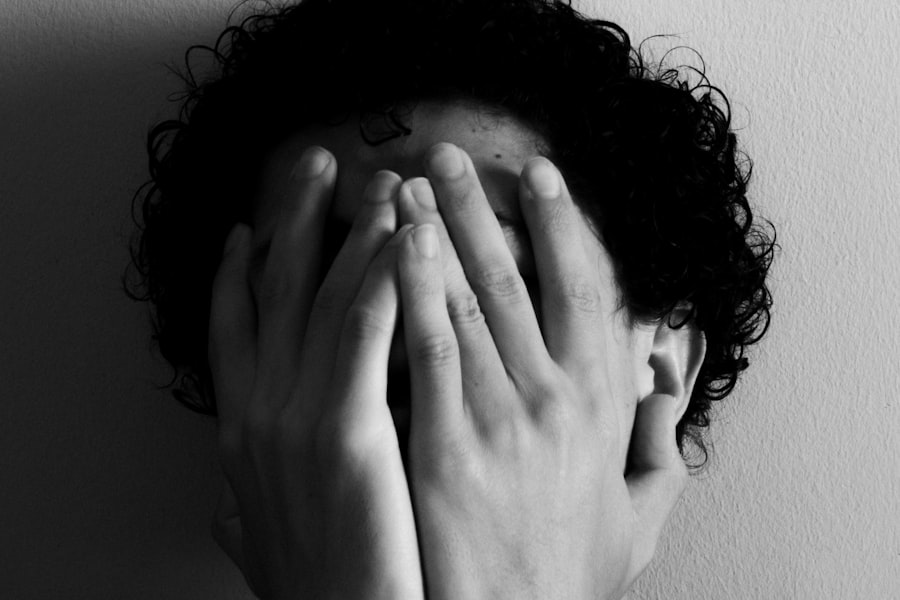Depersonalization Derealization Disorder (DPDR) is a complex mental health condition that can leave you feeling detached from your own thoughts, feelings, and sense of self. Imagine waking up one day and feeling as if you are observing your life from a distance, as if you are merely a spectator in your own existence. This sensation can be disorienting and frightening, often leading to confusion about your identity and reality.
You may find yourself questioning whether you are truly present in the moment or if everything around you is just an illusion. This disorder can manifest in various ways, including feelings of unreality, emotional numbness, and a distorted perception of time. The experience of depersonalization can be triggered by a range of factors, including trauma, anxiety, and extreme stress.
You might find that certain situations exacerbate these feelings, making it difficult to engage fully with the world around you. For many, these episodes can be fleeting, but for others, they can persist for weeks, months, or even years. Understanding the nature of DPDR is crucial for recognizing its impact on your daily life and mental well-being.
It’s essential to acknowledge that you are not alone in this experience; many individuals struggle with similar feelings of detachment and disconnection.
Key Takeaways
- Depersonalization Derealization Disorder (DDD) is a mental health condition characterized by feeling detached from oneself and the surrounding environment.
- Treatment options for DDD include therapy, medication, and lifestyle changes such as stress management and regular exercise.
- While there is no definitive cure for DDD, many individuals experience significant improvement with proper treatment and support.
- Medication and therapy, such as cognitive behavioral therapy, are commonly used to manage symptoms of DDD and improve overall well-being.
- Lifestyle changes and coping strategies, such as mindfulness and relaxation techniques, can help individuals with DDD manage their symptoms and improve their quality of life.
Treatment Options for Depersonalization Derealization Disorder
When it comes to treating Depersonalization Derealization Disorder, a multifaceted approach is often the most effective. You may find that a combination of therapy, medication, and lifestyle changes can help alleviate the symptoms and improve your overall quality of life. One of the primary therapeutic approaches is cognitive-behavioral therapy (CBT), which focuses on identifying and changing negative thought patterns that contribute to your feelings of depersonalization.
Through CBT, you can learn coping strategies to manage anxiety and stress, which may help reduce the frequency and intensity of your episodes. In addition to CBT, other therapeutic modalities such as mindfulness-based therapy and psychodynamic therapy may also be beneficial. Mindfulness practices encourage you to stay present in the moment, fostering a greater connection to your thoughts and feelings.
This can be particularly helpful in counteracting the feelings of detachment associated with DPDR. You might also consider group therapy, where sharing your experiences with others who understand what you’re going through can provide a sense of community and support.
Can Depersonalization Derealization Disorder Be Cured?

The question of whether Depersonalization Derealization Disorder can be cured is complex and varies from person to person. While some individuals may experience a complete resolution of their symptoms over time, others may find that their feelings of depersonalization persist despite treatment efforts. It’s important to recognize that DPDR is often a chronic condition that may require ongoing management rather than a definitive cure.
However, this does not mean that you cannot lead a fulfilling life while managing the disorder. Many people find that with appropriate treatment and support, they can significantly reduce the impact of DPDR on their daily lives. You may discover that by developing coping strategies and engaging in therapeutic practices, you can regain a sense of control over your experiences.
The journey toward managing DPDR is unique for everyone; what works for one person may not work for another. Therefore, it’s essential to remain open to exploring different treatment options and finding what resonates with you.
Medication and Therapy for Depersonalization Derealization Disorder
| Treatment | Effectiveness | Side Effects |
|---|---|---|
| SSRIs (Selective Serotonin Reuptake Inhibitors) | Effective in reducing symptoms for some patients | May cause nausea, sexual dysfunction, or weight gain |
| SNRIs (Serotonin-Norepinephrine Reuptake Inhibitors) | Can help with anxiety and depression symptoms | Possible side effects include insomnia, dizziness, and increased heart rate |
| Therapy (Cognitive Behavioral Therapy, Exposure Therapy) | Effective in helping patients understand and manage symptoms | No physical side effects, but may be emotionally challenging |
Medication can play a role in the treatment of Depersonalization Derealization Disorder, particularly when symptoms are severe or significantly impairing your daily functioning. While there is no specific medication approved solely for DPDR, certain antidepressants and anti-anxiety medications may help alleviate symptoms associated with the disorder. You might find that medications such as selective serotonin reuptake inhibitors (SSRIs) or benzodiazepines can help manage anxiety levels, which in turn may reduce feelings of depersonalization.
However, medication is often most effective when combined with therapy. As previously mentioned, cognitive-behavioral therapy is a common approach that helps you address the underlying thought patterns contributing to your symptoms. In therapy, you can work on developing skills to challenge negative beliefs about yourself and your reality.
This dual approach—using both medication and therapy—can provide a more comprehensive strategy for managing DPDR effectively.
Lifestyle Changes and Coping Strategies for Depersonalization Derealization Disorder
In addition to professional treatment options, making certain lifestyle changes can significantly impact your experience with Depersonalization Derealization Disorder. You might consider incorporating regular physical activity into your routine, as exercise has been shown to reduce anxiety and improve overall mental health. Engaging in activities that promote relaxation, such as yoga or meditation, can also help ground you in the present moment and counteract feelings of detachment.
Establishing a strong support network is another vital aspect of managing DPDR. Surrounding yourself with understanding friends and family members can provide emotional support during challenging times. You may also want to explore online communities or support groups where you can connect with others who share similar experiences.
Sharing your feelings and hearing from others who understand what you’re going through can be incredibly validating and comforting.
Challenges in Curing Depersonalization Derealization Disorder

Despite the various treatment options available, there are significant challenges in curing Depersonalization Derealization Disorder. One major hurdle is the stigma surrounding mental health conditions, which can lead to feelings of isolation and shame. You might find it difficult to discuss your experiences openly due to fear of judgment or misunderstanding from others.
This stigma can prevent you from seeking help or fully engaging in treatment. Additionally, the nature of DPDR itself presents challenges in finding effective treatment. The disorder often coexists with other mental health conditions such as anxiety or depression, complicating the treatment process.
You may find that addressing one issue without considering the others can lead to incomplete healing. It’s essential to work closely with mental health professionals who understand the complexities of DPDR and can tailor a treatment plan that addresses all aspects of your mental health.
Research and Future Developments in Treating Depersonalization Derealization Disorder
Research into Depersonalization Derealization Disorder is ongoing, with scientists striving to better understand its causes and develop more effective treatments. Recent studies have explored the neurobiological underpinnings of DPDR, examining how brain function may contribute to feelings of detachment and unreality. As our understanding of the disorder deepens, new therapeutic approaches may emerge that target these underlying mechanisms more directly.
Future developments may also include advancements in technology-assisted therapies, such as virtual reality exposure therapy. This innovative approach could provide immersive experiences designed to help you confront feelings of depersonalization in a controlled environment. As researchers continue to explore new avenues for treatment, there is hope that more effective strategies will become available for those struggling with DPDR.
Seeking Help for Depersonalization Derealization Disorder
If you are experiencing symptoms of Depersonalization Derealization Disorder, seeking help is a crucial step toward regaining control over your life. You don’t have to navigate this journey alone; reaching out to a mental health professional who specializes in dissociative disorders can provide you with the support and guidance you need. They can help you develop a personalized treatment plan that addresses your unique experiences and challenges.
You deserve to feel connected to yourself and the world around you. By taking this step, you are investing in your mental health and well-being, paving the way for a brighter future where you can manage your symptoms effectively and live a fulfilling life despite the challenges posed by DPDR.
While the question of whether DDD can be fully cured remains a topic of ongoing research, there are various therapeutic approaches that can help manage and alleviate symptoms. Cognitive-behavioral therapy, mindfulness practices, and medication are some of the strategies that have shown promise in treating this disorder. For those interested in exploring more about mental health conditions and their treatments, an insightful article can be found on the Unplugged Psych website. You can read more about related topics by visiting their sample page.
LEARN MORE About Depersonalization & Derealization
FAQs
What is depersonalization-derealization disorder (DDD)?
Depersonalization-derealization disorder (DDD) is a mental health condition characterized by a persistent or recurring feeling of being detached from one’s own body or feeling like the world around them is unreal.
What are the symptoms of depersonalization-derealization disorder?
Symptoms of DDD may include feeling like an outside observer of one’s thoughts, feelings, and body, feeling like the world is unreal or distorted, and experiencing emotional or physical numbness.
Can depersonalization-derealization disorder be cured?
There is currently no known cure for depersonalization-derealization disorder. However, treatment options such as therapy, medication, and lifestyle changes can help manage and reduce symptoms.
What are the treatment options for depersonalization-derealization disorder?
Treatment options for depersonalization-derealization disorder may include psychotherapy (such as cognitive behavioral therapy), medication (such as antidepressants or anti-anxiety medications), and stress-reduction techniques.
Is it possible to live a normal life with depersonalization-derealization disorder?
With proper treatment and support, many individuals with depersonalization-derealization disorder are able to manage their symptoms and live fulfilling lives. It is important to seek help from mental health professionals and develop coping strategies.




